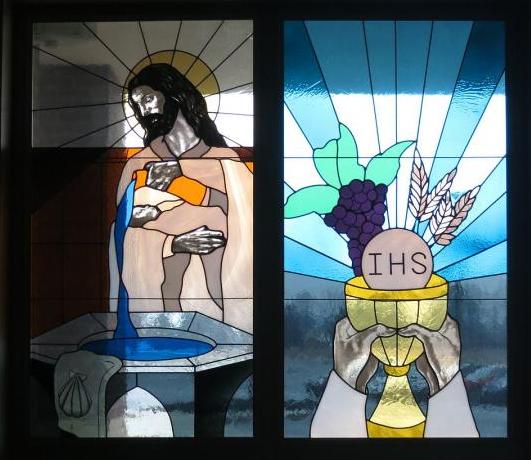Mark Galli, editor-in-chief of Christianity Today, has been writing a thoughtful series of columns on the problems of American Christianity, especially those of an evangelical persuasion. In his latest column, in which he recommends re-emphasizing the Sacraments, he says something shocking to my Lutheran ears.
Many evangelicals, he says, are not even bothering to get baptized at all! And when evangelical churches do baptize, they often accompany that rite with statements that undermine its meaning, explaining that baptism doesn’t really do anything–it certainly has nothing to do with your salvation (despite Mark 16:16 and 1 Peter 3:21) –thereby diminishing its impact on the baptized! (This I have witnessed myself when visiting an ostensibly “high church” evangelical congregation.)
And many evangelical congregations have reduced the Lord’s Supper to a voluntary option during the offering without even bothering with the words of institution!
From Mark Galli, Whatever Happened to Communion and Baptism? in Christianity Today:
Take baptism. Even among churches that believe Matthew 28:19 is the church’s rallying cry—“Go make disciples of all nations, baptizing them ….”—the sacrament is no longer central to their mission. It would be difficult to come by statistics that suggest the problem, but one anecdote suggests it’s a serious one. I belong to an Anglican church in Wheaton, Illinois, which meets not far from Wheaton College. The charismatic singing and Bible-centered preaching attract many Wheaton College students to attend worship and to become members. However, to partake in Communion, as well as to become a member, one must have been baptized. The pastors are continually surprised at the number of Wheaton College students—no doubt some of the most earnest, devout, and intelligent young believers in the evangelical world—who have yet to be baptized. One would have thought that their churches would have attended to this matter long before they left home for college.
Another sign of the problem is the deep fear some evangelicals have of baptism. I attended an independent church in Dallas, Texas, on a Sunday on which they were having a mass baptism for some 400 people. This speaks well of the effectiveness of their outreach and their desire to obey the commands of their Lord. As part of the service, four or five people came on stage and were interviewed by the pastor to help them give their testimony. At the end of each testimony, the last question the pastor asked each was this: “But you don’t believe that baptism saves you, right?” It wasn’t just the question, but the leading way in which it was asked time and again that suggested to me that the pastor was deeply afraid of the power of the sacrament. And the fact that he also asked this right before each person was baptized went a long way into ensuring that the sacrament did not become a means by which God broke in and blessed the recipient but became all about the horizontal: an act of the person’s faith.
The state of the Lord’s Supper is in a worse state. I’ve lost track of the number of startup evangelical churches—again, who are sincerely seeking to reach the world for Christ—whose practice of Communion is frankly a sacrilege. One has to give them credit for, yes, seeking out the lost and taking down unnecessary cultural/religious barriers. And one has to also praise them for at least offering Communion. But in many churches, it is something that is presented during the offering, at a small table holding crackers and juice on the side aisles for those who feel so led to partake. Sometimes this is accompanied by the words of institution, but sometimes it is not.
The idea of Communion—of the body of Christ participating with one another in an ordinance of their Lord—is completely lost. Not to mention the loss of any concerted effort by worship leaders to highlight why the sacrament is a central feature of Christian life.
I get it that there are different theologies, that not everyone holds to our Lutheran understanding of baptismal regeneration and that in Holy Communion Christ gives us His true body and blood for the forgiveness of our sins.
But even if you believe the sacraments are just symbols, such disuse and disrespect takes away even any symbolic meaning!
Can we at least speak about the Sacraments as the Bible speaks about them? Even if you don’t believe in Baptismal regeneration–if you believe regeneration happens in a conversion experience and that Baptism does not convey the Holy Spirit–you can explain that. But don’t say, as I have heard it said at a baptism just as Mr. Galli reports, that “Baptism does not save you” when the Bible says “Baptism now saves you” (1 Peter 3:21).
As Mr. Galli asks, “Why aren’t we doing what Jesus told us to do?”
Some of the very congregations that put the most emphasis on the Great Commission strangely neglect the specifics of what Christ said: “Go therefore and make disciples of all nations, baptizing them in the name of the Father and of the Son and of the Holy Spirit” (Matthew 28:19).
As for Communion, Jesus uses the imperative: “Take, eat.” “Drink of it.” “Do this in remembrance of me” (Matthew 26: 26-27 ; Luke 22:19). One might debate what He meant by saying that this bread is His body and this wine is His blood, but surely the “take,” “eat,” “drink,” and “do this” are clear enough.
Mr. Galli says that evangelicals used to take these sacraments or ordinances or whatever you want to call them more seriously. The Second Great Awakening, he says, had its beginnings in a service of preparation for Communion. Mr. Galli’s point in his entire series is that while many of America’s churches have achieved great organizational success, “We have forgotten God.” To bring God back into our worship, mission, and activism, recovering the Sacraments is a good place to start.
Photo: Saint John Neumann Catholic Church (Sunbury, Ohio) – stained glass, narthex, Sacraments of Baptism & the Eucharist by Nheyob [CC BY-SA 3.0 (https://creativecommons.org/licenses/by-sa/3.0)] via Wikimedia Commons














